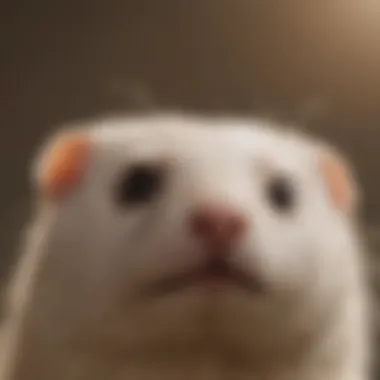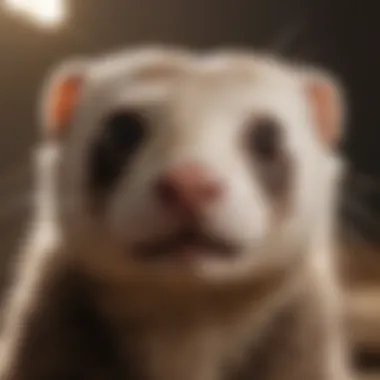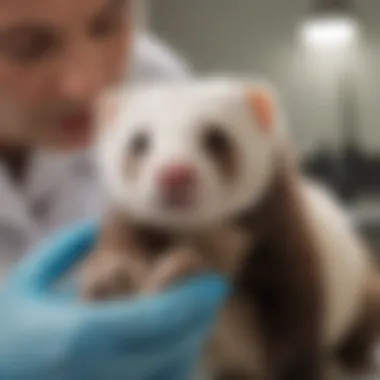Comprehensive Guide to Ferret Hair Loss Treatment


Intro
Ferrets are unique creatures known for their playful and curious nature. However, like any pet, they can face health issues, including hair loss. Understanding the factors that contribute to this condition is essential for all ferret owners. This guide aims to provide a detailed analysis of ferret hair loss, addressing causes, symptoms, diagnostics, and treatment options. Knowing what to look for can help in early detection, leading to effective intervention. This can ultimately enhance the well-being of your pet.
Understanding Your Pet
Before diving into the complexities of hair loss, it is crucial to understand ferrets as pets. They have distinct behaviors and needs that influence their overall health.
Pet Behavior Basics
Ferrets are social animals. They thrive in environments that provide stimulation and interaction. Observing their behavior can reveal signs of discomfort or stress, which may relate to health problems such as hair loss. Engaging with them regularly helps in recognizing any changes in their temperament or activity levels.
Common Breed Characteristics
Ferrets come in different breeds, each possessing unique traits. Some breeds may be more susceptible to certain health issues. For instance, while the domestic ferret is commonly kept as a pet, an understanding of the specific characteristics of the breed can help in identifying potential health risks.
Species-Specific Needs
Ferrets have particular dietary and environmental needs. Understanding these needs is vital. A balanced diet rich in protein and appropriate housing conditions can prevent health issues. Neglecting their species-specific requirements may lead to stress, which can contribute to hair loss.
Pet Care and Maintenance
Proper care and maintenance are foundational to ensuring a healthy life for your ferret.
Feeding Guidelines
A well-rounded diet is crucial. Ferrets are obligate carnivores, meaning their diet should consist primarily of meat. High-quality ferret food, such as those from Marshall Ferrets or Zupreem, should be the mainstay. Supplementing with cooked chicken or turkey can provide variety and extra protein.
Grooming Essentials
Regular grooming is necessary to maintain a healthy coat. Use a soft brush to reduce loose hair and prevent matting. Frequent grooming also provides an opportunity to check for skin irritations or abnormalities that could indicate a health concern.
Hygiene Practices
Keeping your ferret's living environment clean is vital. Regularly clean their habitat to minimize stress and the risk of infections. Ensure their litter box is kept tidy, and provide fresh water at all times.
Health and Wellness
Being attentive to your ferret's health can lead to early detection of issues like hair loss.
Routine Vet Check-ups
Regular veterinary check-ups are essential. A vet can perform necessary assessments to monitor your ferret’s health. They can also educate you on what signs to watch for at home.
Vaccination Needs
Like other pets, ferrets require specific vaccinations. Ensuring that they are vaccinated against distemper and rabies is crucial for their health and can prevent illness that may lead to hair loss.
Recognizing Signs of Illness
Awareness of illness signs is critical. A lethargic ferret, changes in appetite, or excessive scratching can indicate health issues, including skin problems or allergies that cause hair loss. Prompt attention can make a significant difference in treatment outcomes.
Enrichment and Activities
To support your ferret's mental and physical well-being, providing varied activities is important.
Indoor vs.
Outdoor Activities


Both indoor and outdoor activities can benefit your ferret. Safe outdoor time can offer new experiences, while indoor play is essential for exercise. Structured playtime helps alleviate boredom, reducing stress and related health issues.
Interactive Toys and Games
Interactive toys can stimulate your ferret's intelligence. Puzzle toys allow them to engage their problem-solving skills while providing entertainment.
Socialization Opportunities
Socializing with other ferrets or animals can enhance their life quality. Ensure any interactions are safe to prevent stress or injury.
Important: Consistent interaction and care greatly impact ferret health, influencing conditions such as hair loss.
By taking thorough care of your ferret and understanding their specific needs, you set a foundation for better health. Educational resources and veterinary advice should also be utilized to foster a healthier pet environment.
Understanding Ferret Hair Loss
Ferret hair loss is a common concern for pet owners, and understanding it is crucial for ensuring the health and well-being of these playful animals. This section provides an overview that highlights the essential factors affecting hair loss in ferrets. Learning about the causes and mechanisms of hair loss can help owners take preventive measures and seek timely treatment.
Defining Hair Loss in Ferrets
Hair loss in ferrets, also known as alopecia, is characterized by a noticeable reduction in fur density or the sudden appearance of bald patches. This condition can be alarming for pet owners, as the fur of ferrets not only serves a protective function but also plays a role in their thermoregulation and sensory perception. Recognizing hair loss early can lead to better outcomes, as many causes require swift intervention. For example, certain medical conditions can lead to systemic issues if not addressed promptly.
The Biological Mechanisms of Hair Loss
The biological processes behind hair loss in ferrets involve several factors, including skin health, hormonal levels, and genetic predispositions. Hair follicles go through cycles of growth, rest, and shedding. Disruptions in any of these cycles can lead to abnormal hair loss. Hormonal imbalances are one significant factor; conditions such as adrenal disease can affect hormone levels and, consequently, fur growth.
Moreover, skin infections or infestations of parasites can also influence hair loss by damaging the hair follicles or irritating the skin. Understanding these biological mechanisms is essential for pet owners to identify the underlying issues contributing to their ferret's hair loss. Analyzing the symptoms and behaving promply can help ensure that affected ferrets receive appropriate care and treatment.
Hair loss in ferrets can result from both external and internal factors, making it essential for owners to observe their pets closely for changes that may signal underlying health issues.
By comprehensively understanding the complexities of ferret hair loss, owners can be better equipped to not only recognize symptoms but also implement effective diagnostic and treatment pathways.
Recognizing Symptoms of Hair Loss
Recognizing hair loss in ferrets is a crucial step for any pet owner. Early identification of symptoms not only helps in addressing the issue promptly but also can prevent more severe health problems. Some may think that hair loss is merely cosmetic, but it often points to underlying health issues. The welfare of the ferret can depend on timely action once a problem is noticed. Observing changes and taking appropriate measures can significantly improve the overall health and happiness of the ferret.
Identifying Patches and Thinning
When examining ferrets for hair loss, look for specific patterns. Patches may form on various body parts. These areas might show a complete loss of fur, while other parts appear thin. Noticing a specific shape to hair loss can indicate a particular problem. For instance:
- Circular patches may suggest a fungal issue.
- Thin spots near the tail or neck might be linked to stress or hormonal changes.
- The gradual thinning of fur across the body can reflect nutritional deficiencies.
Ferrets often groom themselves diligently. However, too much grooming leading to hair loss can hint at anxiety or skin irritation. It's vital to make visual assessments regularly. Grooming routines may highlight these changes, leading to earlier intervention.
Behavioral Changes Associated with Hair Loss
Behavioral aspects can also provide insight into the ferret's condition. A notable change in behavior can accompany hair loss. Some key observations may include:
- Increased irritability or agitation: This can be linked to discomfort caused by skin issues.
- Changes in activity levels: A loss of interest in play can signal underlying health problems.
- Shift in grooming habits: Excessive grooming can indicate stress. Alternatively, a decrease might suggest health complications.
In observing these symptoms, owners should consider the connection between physical appearance and psychological well-being. Conducting a thorough check of both behavior and appearance can lead to a more effective understanding of an individual ferret's health condition. Quick recognition of these behavioral changes can be highly beneficial in seeking timely veterinary guidance.
Common Causes of Hair Loss in Ferrets
Understanding the common causes of hair loss in ferrets is crucial for owners wishing to maintain their pet's health. Identifying the underlying reasons helps in providing effective treatment and implementing preventive measures. Many factors can contribute to this condition, ranging from genetics to environmental influences. By grasping these causes, pet owners can act promptly to mitigate the impact on their ferret's well-being.
Genetic Factors
Genetic predisposition plays a significant role in the occurrence of hair loss among ferrets. Some ferret breeds may be more susceptible to skin problems and hair-related conditions. Recognizing these breed-specific traits is essential for owners. Some lines of ferrets might inherently have a thinner coat, which could lead to easy hair loss under stress. Evaluating the genetic background of the ferret can offer insights into potential health risks and aid proactive health management. Additionally, responsible breeding practices that prioritize health can reduce such issues.
Nutritional Deficiencies


Nutritional health is vital for the overall well-being of ferrets. Deficiencies in essential vitamins and minerals can directly impact coat quality and lead to hair loss. A diet lacking crucial nutrients like Vitamin A, Vitamin E, and essential fatty acids can result in dry skin and a weak fur coat. Ferret owners should focus on providing a balanced diet rich in animal protein and proper supplements. Regular consultation with a vet regarding the ferret’s diet can prevent potential deficiencies and maintain healthy skin and fur.
Hormonal Imbalances
Hormonal imbalances in ferrets can significantly affect their skin and fur health. Conditions like adrenal gland disease are particularly common and can cause severe hair thinning. Awareness of signs, such as itching or increased weakness, is crucial. Hormonal fluctuations might arise due to metabolic disorders, stress, or even age-related changes. Early detection and appropriate treatment can help stabilize hormone levels, which may reduce fur loss and restore normal coat conditions.
Infections and Parasites
Infections, whether bacterial or fungal, can lead to significant hair loss in ferrets. Parasitic infections, such as those caused by mites or fleas, can result in severe itching and inflammation, causing the ferret to lose hair in patches. Identifying signs of such infections promptly is essential. Routine veterinary check-ups and proper grooming can help in early detection and treatment of these issues. Owners should also maintain a clean living environment to reduce the likelihood of infection or infestation.
Regular monitoring and swift action can prevent minor issues from escalating into serious health concerns. Taking proactive measures will reflect positively on your ferret's quality of life.
Diagnostic Procedures for Hair Loss
Understanding the diagnostic procedures for hair loss in ferrets is crucial for effective treatment. Early detection is essential to manage the condition before it leads to extensive fur loss or underlying health issues. Identifying the cause of hair loss can significantly affect the course of treatment. Therefore, veterinary diagnostic evaluations are not just recommended but vital.
Veterinary Examination
A comprehensive veterinary examination serves as the initial step in diagnosing hair loss in ferrets. During this examination, the veterinarian will assess the ferret's overall health and look for signs of skin irritation, infections, or other anomalies.
- Physical Health Assessment: The vet will check for any other noticeable symptoms, like weight loss, lethargy, or changes in appetite. These could provide hints about the underlying cause.
- Medical History Review: Owners should provide information regarding diet, behavior, and any changes observed. This context is invaluable.
A full examination can reveal conditions that necessitate further testing, paving the way for a more directed assessment of hair loss sources.
Skin Scraping and Cultures
Skin scraping is a non-invasive method commonly utilized to investigate dermatological issues in ferrets. It helps identify parasites, fungal infections, and other skin problems.
- Procedure: The veterinarian will scrape the skin in affected areas to collect cells and organisms for examination under a microscope.
- Cultures: This may be followed by cultures to detect infections in a laboratory setting, allowing for precise identification of any pathogens present.
The results from skin scrapes and cultures provide essential information for targeted therapeutic options. Detecting issues such as mange or fungal infections early can dramatically improve treatment efficacy.
Blood Tests for Hormonal Levels
Blood tests play a significant role in evaluating hormonal imbalances, which can contribute to hair loss in ferrets. Hormonal disorders like adrenal gland disease can lead to excessive fur loss and pose serious health risks.
- Testing Process: Blood samples are taken and analyzed for hormone levels, particularly adrenal hormones.
- Interpreting Results: Abnormal hormonal levels may suggest specific conditions requiring intervention.
These tests reduce the guesswork in diagnosing hair loss and help establish a more effective treatment plan based on solid data.
Establishing a comprehensive diagnostic approach enables ferret owners to make informed decisions about their pet's health, leading to timely and effective treatment.
By following these diagnostic procedures, ferret owners can ensure that any hair loss issues are addressed promptly, promoting better health for their pets.
Treatment Options for Ferret Hair Loss
In managing ferret hair loss, identifying appropriate treatment options is critical. Effective interventions can improve the quality of life for affected ferrets and foster a supportive environment for recovery. Choosing the right treatment often depends on the underlying cause of the hair loss, which can vary widely between individual cases. Therefore, pet owners should consider multiple strategies in conjunction with veterinary advice to address this condition comprehensively.
Nutritional Adjustments
Nutritional changes can play a significant role in addressing hair loss in ferrets. High-quality protein sources are vital as ferrets are obligate carnivores. A well-balanced diet that includes adequate levels of fatty acids, vitamins, and minerals can help improve hair quality.
Incorporating foods like ferret-specific kibbles or raw meat can be beneficial. It's advisable to avoid low-quality commercial diets containing fillers and artificial additives. Omega-3 and Omega-6 fatty acids are particularly important as they contribute to skin health and fur vitality.
- Considerations: Monitoring your ferret's weight is essential during dietary adjustments. Overweight ferrets may experience additional health complications.
Topical Treatments
Topical treatments can be effective for addressing localized hair loss. These often include medicated shampoos and ointments. Many of these products contain ingredients such as aloe vera or tea tree oil, which can soothe irritated skin and promote hair growth. However, it is essential to consult with a veterinarian before applying these products to ensure they are safe for your ferret.
Another option is to apply topical supplements that are designed to nourish the skin directly. Often, these include vitamins or natural oils that can penetrate the skin barrier, providing essential nutrients.


Preventive Measures for Hair Loss
Preventing hair loss in ferrets is crucial for their overall health and well-being. Taking proactive steps can minimize the risk or severity of hair loss, thereby ensuring your ferret remains playful and active. Understanding preventive measures can help avoid serious underlying health issues and promote a long, healthy life for your pet. This section covers essential areas to focus on, such as regular veterinary check-ups and a balanced diet. Both aspects contribute significantly to prolonging your ferret's hair and fur health.
Regular Veterinary Check-ups
One of the best ways to prevent hair loss in ferrets is to schedule regular veterinary check-ups. These appointments allow a veterinarian to assess your ferret's overall health and identify any potential issues before they become significant problems. Early detection can lead to prompt treatments, which can help prevent hair loss. During the visit, your vet may perform various examinations and tests to check for skin conditions, hormonal imbalances, and nutritional deficiencies.
It's essential to ensure that your ferret's vaccinations are up to date and that they receive routine blood tests, which can offer insight into any underlying problems. If your ferret shows signs of itching or excessive shedding, communicating these issues to your veterinarian is equally important. They can create a tailored treatment plan based on the specific needs of your pet.
Consider these points for scheduling vet visits:
- Frequency: Typically, a check-up every six months is recommended for young ferrets, while older ferrets may require more frequent evaluations.
- Preventive Health Care: Regular visits provide an opportunity for preventive care, which can save you time and costs in the long run.
- Building a Relationship: Establishing a good relationship with your veterinarian can enhance the quality of care your ferret receives.
Balanced Diet and Nutrition
A balanced diet plays a vital role in preventing hair loss and maintaining your ferret's fur quality. Ferrets are obligate carnivores; this means they require a diet high in protein and low in carbohydrates. Commercial ferret foods often provide the necessary nutrients, but it's essential to select a high-quality brand.
Feeding your ferret a diet rich in animal proteins can support healthy skin and fur. Look for products with ingredients like chicken, turkey, or lamb, which can strengthen fur and prevent abnormalities. Additionally, combining these foods with fresh water and occasional treats contributes to overall nutrition, which can lead to better requirements for maintaining fur health.
Some crucial highlights regarding diet considerations:
- Consultations: Always consider your veterinarian's advice when selecting a diet for your ferret.
- Avoid Low-Quality Brands: Low-quality ferret foods may lack necessary nutrients, leading to deficiencies that could cause hair loss.
- Monitor Weight: Maintain proper body weight through a balanced diet to reduce stress on your pet’s body and skin health.
A well-thought-out diet and regular check-ups create a strong foundation for preventing hair loss in ferrets, ultimately promoting their overall health.
Additional Resources and Support
Understanding and addressing hair loss in ferrets can be complex. Additional resources and support play a pivotal role in assisting pet owners through this journey. Having reliable information and a support network can significantly enhance the care ferret owners provide, helping them navigate various challenges that may arise.
Finding the Right Veterinarian
Selecting a veterinarian who specializes in exotic pets, particularly ferrets, is essential. Ferrets have unique health needs and a general veterinarian may not be familiar with specific conditions such as adrenal disease or insulinoma, which can contribute to hair loss.
Consider these factors when searching for a suitable veterinarian:
- Experience with Ferrets: Ensure the veterinarian has a good track record working with ferrets specifically. Ask about their training or experience related to exotic animals.
- Availability for Emergencies: Check whether they offer emergency services or if they can refer you to someone who does. This can be crucial in urgent situations.
- Network Recommendations: Seek recommendations from other ferret owners or local ferret rescue organizations. They often have firsthand experiences with competent veterinarians.
- Communication Style: Assess how well the vet communicates and if they take the time to answer questions thoroughly. This ensures that you remain informed about your pet’s health.
Establishing a relationship with a knowledgeable veterinarian can provide peace of mind and help address hair loss issues swiftly.
Online Communities and Forums
Online communities and forums can be valuable resources for ferret owners dealing with hair loss. Engaging with others who share similar experiences enriches knowledge and support. Here are some key benefits of participating in these groups:
- Shared Experiences: Finding others who have dealt with similar concerns can be reassuring. They offer insights into what worked for them and what didn’t.
- Tips and Resources: Members frequently share useful articles, links, and suggestions for both treatment and management of hair loss in ferrets.
- Emotional Support: Caring for a pet with health issues can be emotionally taxing. Online communities provide an outlet for expressing concerns and receiving encouragement.
- Updates on Research: These forums often discuss new findings related to ferret health, which can help owners stay informed about advancements in treatment options.
Participating in online forums like those found on Reddit or Facebook can significantly enhance your understanding and management of ferret hair loss.
By tapping into both veterinary advice and community support, ferret owners can feel more confident in handling hair loss issues and ensuring their pets lead healthy, comfortable lives.
Ending: Ensuring Ferret Well-being
As we reach the conclusion of this exploration into ferret hair loss, it becomes clear that understanding this topic is vital for every ferret owner. Hair loss in ferrets is not merely a cosmetic issue; it can indicate underlying health problems. Prompt action in addressing hair loss can prevent further complications and ensure a better quality of life for the ferret.
The Importance of Prompt Action
Acting quickly when hair loss is noticed can make all the difference. Delayed response to symptoms may aggravate the situation. Ferrets are susceptible to various health issues, and hair loss is a sign that should not be ignored. When owners recognize the signs early, they can seek veterinary advice and potentially avoid more serious problems.
- Assessment: Regular monitoring of a ferret's coat can help in identifying hair loss patterns.
- Veterinary Consultation: Promptly consulting a veterinarian offers the opportunity for early diagnosis.
- Treatment Options: With early intervention, various treatments can be explored successfully.
"Timely actions can lead to better health outcomes for ferrets, and owners must take note of any changes in their pet's grooming habits or appearance."
Fostering a Healthy Environment
Creating a healthy and supporting environment is essential for ferrets. This involves both physical and emotional aspects. Ferrets require a space that accommodates their natural behaviors, including play and exploration. An enriching environment promotes overall well-being and reduces stress, which can be a contributing factor to hair loss.
- Nutrition: Provide a balanced diet that supports health and coat condition. Ferrets are obligate carnivores, so quality protein sources are crucial.
- Facility Care: Ensure proper hygiene in the living area to prevent infections.
- Social Interaction: Regular interaction and playtime with owners can foster emotional health.
- Veterinary Support: Establishing a strong relationship with a veterinarian ensures ongoing health monitoring and advice.







